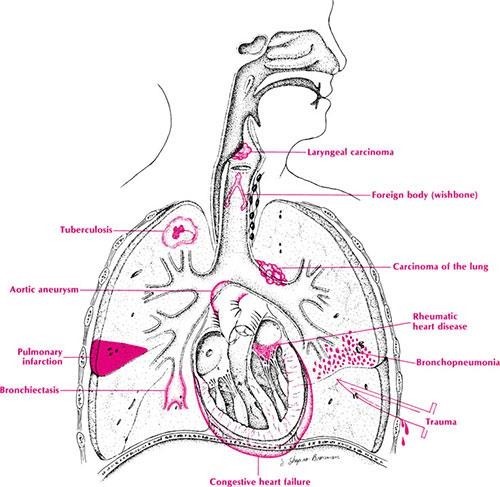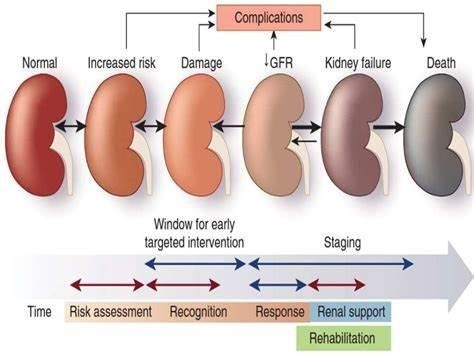A client is admitted with shortness of breath and hemoptysis. After several tests, the healthcare provider informs the client that the medical diagnosis is stage 4 breast cancer. The client tells the nurse about the decision not to inform the family about the diagnosis. Which intervention should the nurse implement?
Notify the health department of the client's condition.
Advise the client to weigh all possible outcomes prior to the decision.
Suggest to the family the value of genetic screening.
Explain that the family has a right to know of potential health problems.
Explain that the family has a right to know of potential health problems.
The Correct Answer is B
A) This intervention is not appropriate because it violates the client's privacy and confidentiality. The health department does not need to be notified of the client's condition, as breast cancer is not a communicable disease or a public health threat. The nurse should respect the client's wishes and only share information with authorized persons or agencies.
B) This intervention is appropriate because it respects the client's autonomy and encourages informed decision-making. The nurse should advise the client to consider the benefits and risks of disclosing or withholding the diagnosis from the family, and how it may affect their relationships and support systems. The nurse should also provide relevant information and resources to help the client make an informed choice.
C) This intervention is not appropriate because it contradicts the client's decision and may cause confusion or distress for the family. The nurse should not suggest genetic screening to the family without the client's consent, as this may imply that they are at risk of developing breast cancer or other genetic disorders. The nurse should also avoid giving unsolicited advice or opinions that may interfere with the client's autonomy.
D) This intervention is not appropriate because it imposes the nurse's values and beliefs on the client. The nurse should not explain that the family has a right to know of potential health problems, as this may imply that the client is wrong or selfish for withholding the diagnosis. The nurse should acknowledge and respect the client's perspective and preferences, and support them in coping with their condition.

Nursing Test Bank
Naxlex Comprehensive Predictor Exams
Related Questions
Correct Answer is B
Explanation
A) This client has a mild fever, which may indicate an infection or inflammation. This is a potential complication of enteral feedings, but it is not the most urgent situation. The nurse should monitor the client's vital signs, assess the feeding tube site, and notify the provider if the fever persists or worsens.
B) This client has signs of uremic encephalopathy, which is a life-threatening condition caused by the accumulation of toxins in the brain due to impaired renal function. The nurse should intervene immediately to prevent further
neurological damage and possible coma or death. The nurse should assess the client's level of consciousness, check the blood pressure and urine output, and prepare to administer dialysis or other treatments as ordered by the provider.
C) This client has heat stroke, which is a serious condition that can lead to dehydration, electrolyte imbalance, and organ damage. However, the client is receiving a normal saline IV fluid bolus, which is an appropriate intervention to restore fluid volume and correct sodium levels. The nurse should continue to monitor the client's vital signs, skin
temperature, and urine output, and watch for signs of fluid overload or cerebral edema.
D) This client has hyperemesis gravidarum, which is a severe form of nausea and vomiting during pregnancy that can lead to dehydration, malnutrition, and electrolyte imbalance. However, the client is receiving an infusion of Ringer's Lactate, which is an isotonic solution that can replenish fluid and electrolyte losses. The nurse should continue to monitor the client's vital signs, weight, and intake and output, and administer antiemetics or other medications as ordered by the provider.

Correct Answer is D
Explanation
Choice A Reason: Managed healthcare plans do not pay for any in-hospital medical evaluations is not the best information for the nurse to provide this family. This statement is false and misleading. Managed healthcare plans may cover in-hospital medical evaluations if they are deemed medically necessary and authorized by the plan. The nurse should not discourage the family from seeking appropriate care for their mother based on inaccurate information.
Choice B Reason: Healthcare costs are escalating because clients want to have diagnostic testing conducted in the hospital is not the best information for the nurse to provide this family. This statement is irrelevant and insensitive. Healthcare costs are influenced by many factors, such as technology, inflation, regulation, and demand. The nurse should not blame the clients for wanting to have diagnostic testing done in the hospital, which may be essential for their health and well-being.
Choice C Reason: The client is grieving normally in response to her husband's death and hospitalization is not necessary is not the best information for the nurse to provide this family. This statement is presumptuous and dismissive. Grief is a complex and individual process that may affect people differently. The nurse should not assume that the client's confusion and disorientation are normal signs of grief, which may mask underlying medical conditions that require evaluation and treatment.
Choice D Reason: Managed care providers have mandatory pre-certification requirements for hospitalization is the best information for the nurse to provide this family. This statement is factual and helpful. Pre-certification is a process by which managed care providers review and approve proposed hospital admissions, procedures, or services before they are performed. The nurse should inform the family that they need to obtain pre-certification from their mother's plan before admitting her to the hospital, or they may face denial of coverage or higher out-of-pocket costs.
Whether you are a student looking to ace your exams or a practicing nurse seeking to enhance your expertise , our nursing education contents will empower you with the confidence and competence to make a difference in the lives of patients and become a respected leader in the healthcare field.
Visit Naxlex, invest in your future and unlock endless possibilities with our unparalleled nursing education contents today
Report Wrong Answer on the Current Question
Do you disagree with the answer? If yes, what is your expected answer? Explain.
Kindly be descriptive with the issue you are facing.
